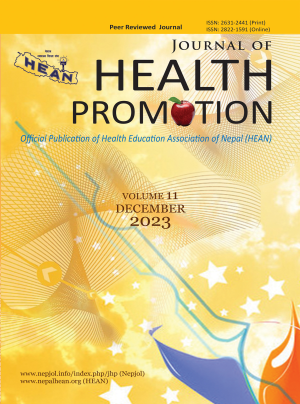Parental and Teacher Factors Associated with Cognitive Development of Preschool Children
DOI:
https://doi.org/10.3126/jhp.v11i1.61210Abstract
Early years are the foundational stages for children's cognitive development. This study aimed at analyzing the parental and teacher characteristics associated with preschool children's cognitive development. A cross-sectional design based on quantitative data was adopted in the study. A standard checklist was used to test the cognitive skills of 280 preschool children sampled through multi-stage cum stratified method equally from community and institutional schools in Birendranagar Municipality of Surkhet district in Nepal. The 280 parents and 32 teachers of these children were interviewed for their background characteristics. Many parental and teacher characteristics had significant association with children's cognitive development. The mothers with secondary level and higher education and employing non-labour occupation were associated with their children's higher cognitive outcomes. Similarly, teachers with secondary level and higher degree, preschool experiences below ten years, and high-paid salaries had significant positive association with children's cognitive development. Additionally, parental interaction and engagement with children and their teachers were beneficial for better cognitive skills of the children. So, the educational plans, policies, and programmes should give equal priority to the parental programmes to sensitize and empower the parents, especially the mothers, for their active roles in caring their children and interacting with the teachers. At the same time, the government and all the educational institutions should minimize the gap on teacher's pay between preschool and higher levels.
Downloads
Downloads
Published
How to Cite
Issue
Section
License
Copyright (c) 2023 Health Education Network (HEAN)

This work is licensed under a Creative Commons Attribution-NonCommercial 4.0 International License.
© Health Education Network (HEAN)
Authors are required to transfer their copyright to the Health Education Association of Nepal (HEAN).
The materials of this publication may be reproduced, reviewed and translated, acknowledging the source "Journal of Health Promotion".




